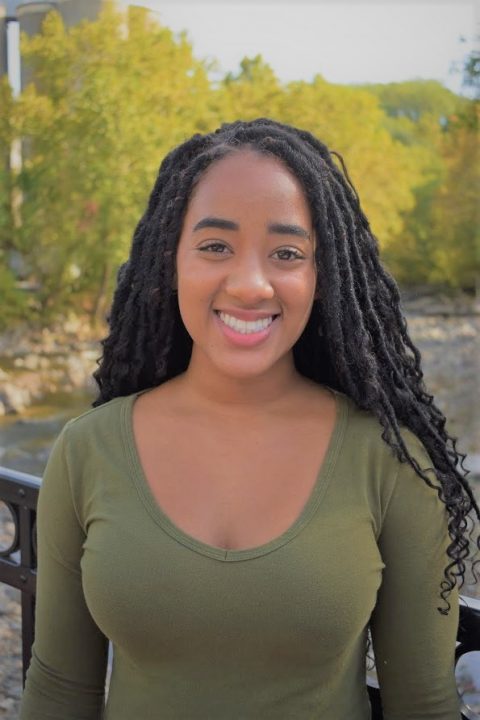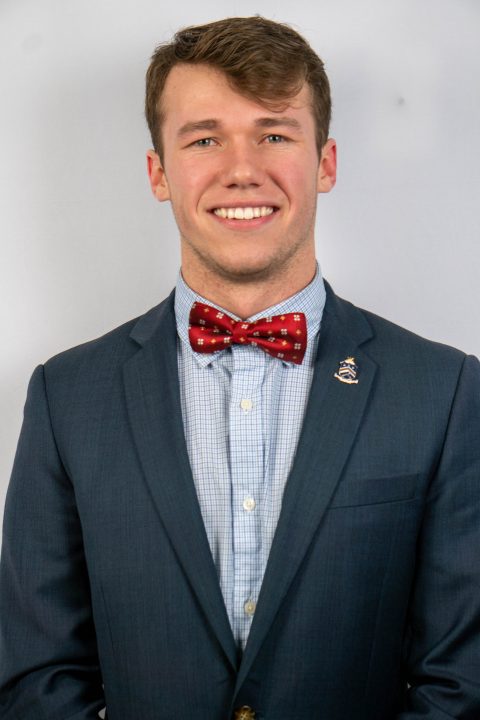Editor’s Note: This article has been updated to include additional information about Kayla Dunn’s campaign.
Last week, we reached out to the 14 Student Government Association senatorial candidates via email to get a sense of their campaign and their qualifications. We asked each candidate the same eight questions about themselves and their platform, but there were two questions that we felt were the most important.
- What initiatives are you planning to work on if elected?
- What is your vision of student engagement?
Twelve candidates responded with answers. Eleven senatorial positions are up for grabs. Vanshika Agarwal and Erik Wikane did not comment.
Nailah-Benã Chambers
 Nailah-Benã Chambers. Photo courtesy of Nailah-Benã Chambers.
Nailah-Benã Chambers. Photo courtesy of Nailah-Benã Chambers.Nailah-Benã Chambers is working on a reelection campaign for a University of Maryland, Baltimore County SGA Senate seat.
A freshman global studies and Chinese major, as well as a Humanities Scholar, Chambers is serving as an SGA senator for the spring 2020 semester. She credits this time with allowing her to grow in her knowledge of SGA processes and is “open to working on any initiative that is within student’s concern,” she wrote.
Chambers views student engagement as a reflection of how “comfortable” a student is in their ability to participate in SGA and other student organizations, and she plans to “hear student’s voices and to help turn their ideas into a reality for the campus.”
Kayla Dunn
 Kayla Dunn. Photo courtesy of Kayla Dunn.
Kayla Dunn. Photo courtesy of Kayla Dunn.Kayla Dunn wants to increase students’ exposure to humanities organizations around campus and hopes, if elected, to “give more students the means to express themselves in a safe and positive manner,” they wrote.
While Dunn, a sophomore psychology major, is involved in a research lab on campus, they are also the secretary for Musical Theatre Club, and believes that they are “acquainted with the struggle of balancing both of my passions.” Their involvement in creative activities and student organizations satisfies their need for self-expression, one that they believe other students would benefit from.
“I am the perfect example of a scientifically inclined individual who enjoys artistic endeavors,” they wrote. “… I found that being able to participate in creative activities and clubs around campus has satisfied my need for expression, without getting in the way of my schoolwork.”
Dunn hopes to provide greater publicity to UMBC’s arts organizations, thereby meeting the “demand” from students that they see for these organizations.
Julius Gayle
 Julius Gayle. Photo courtesy of Julius Gayle.
Julius Gayle. Photo courtesy of Julius Gayle.As a First Year Ambassador with a placement in the SGA Senate, Julius Gayle has already worked directly with current senators in order to assist them with their meetings and initiatives.
Gayle is a freshman psychology major and will be a Resident Assistant in the fall in Patapsco Hall. In his capacity as an FYA, Gayle is currently working on an initiative with two SGA senators and a Finance Board representative to provide free menstrual products to campus. He is also hoping to work on an initiative that will allow students to learn more about clubs and organizations around campus.
Gayle wrote that he will “find a way” to work on both these initiatives if not elected.
“My vision for student engagement is … where any student can have the opportunity to express themselves and join a club that matches their interests,” he wrote.
Colin Grayson
If elected, Colin Grayson, a junior history major, plans to “make it [UMBC] united as one people, as Retrievers under God” and “get rid” of a political organization on campus that Grayson went on to call a “hate group” with “fascist standards.” The name of the organization has been withheld due to Grayson’s fear for his physical safety.
In a later email, Grayson stated he plans on “reducing the budget and power of student government in favor of a more democratic approach for the students.”
Grayson has since asked The Retriever to disregard his original statement, even though it was provided with the knowledge it was on the record, and while he was given the opportunity to clarify his statement regarding the political organization multiple times, he ultimately did not do so.
Kai Hajos
 Kai Hajos. Photo courtesy of Kai Hajos.
Kai Hajos. Photo courtesy of Kai Hajos.With two years as an SGA senator already under his belt, Kai Hajos is hoping that his third term will allow him to both follow through on past senatorial initiatives and plan for and begin new ones.
Currently, Hajos, a junior psychology major, is working on an initiative to bring free menstrual products to gender-neutral bathrooms across campus, and he is also trying to improve accessibility across campus for students with mobile imparities. He has a “blueprint” of possible changes, but this initiative has been paused due to the pandemic.
Hajos is also working to provide “greater transparency” to students about what SGA does.
Menna Nasser
 Menna Nasser. Photo courtesy of Menna Nasser.
Menna Nasser. Photo courtesy of Menna Nasser.Unlike most senatorial candidates, Menna Nasser has not had previous SGA experience, but she believes that her “fresh perspective” makes her uniquely qualified.
A sophomore biology major, Nasser is planning to bring students to SGA meetings so that they can “learn how the Senate functions as a whole and let them represent their own plans for change,” she wrote.
Nasser, who is a member of the Muslim Student Association, is looking forward to potentially working on the development of the Interfaith Center on campus and also hopes to increase sustainability and accessibility efforts on campus. Ultimately, however, she wants to make sure that she is working on initiatives “based on student needs.”
“I hope undergraduate students at UMBC become more engaged by sharing concerns and actually working with SGA Senators on ideas to help improve the campus,” she wrote.
Emmanuel Okhuevbie
Emmanuel Okhuevbie believes in teamwork and hopes that, if elected to a senatorial position, he can “help students navigate their path” as they pass through UMBC by emphasizing problem solving.
 Emmanuel Okhuevbie. Photo courtesy of Emmanuel Okhuevbie.
Emmanuel Okhuevbie. Photo courtesy of Emmanuel Okhuevbie.As a degree graduate from the Community College of Baltimore County, Okhuevbie, who is now a sophomore biology major, worked closely with the director of the Honors program. With the leadership skills Okhuevbie has taken from this position, he has continued to practice “patience and listening to a fellow student’s needs,” according to his biography on the SGA election webpage.
Mariah Qureshi
 Mariah Qureshi. Photo courtesy of Mariah Qureshi.
Mariah Qureshi. Photo courtesy of Mariah Qureshi.The thing Mariah Qureshi loves most about UMBC is its diversity, and she is hoping, if elected to a senatorial position, that she will get to work towards inclusivity initiatives, like improving accessibility and engaging commuter students, on campus.
As an FYA, Qureshi, a freshman computer science major, has held placements in the Executive Council and Senate, which has allowed her to understand the structure of SGA and the duties of a senator.
“I’m running for this position because I’m a regular student on campus, like the rest of our student population here,” Qureshi wrote. “I’ve a drive to help our students in ways that will be catered to their needs and interests, and I’ve a passion to continue to aid in making sure that UMBC is a safe, comfortable environment where everyone feels they are welcomed.”
Qureshi hopes to use her office hours to facilitate conversations with students about their needs and concerns and hopes it will help in “uplifting those that don’t seem to be having the best time … be[ing] engaged within our community,” she wrote.
Patrick Reid
Current SGA Executive Vice President Patrick Reid is running for a senatorial position, a position he previously held his sophomore year. Reid, a junior political science and global studies double major, wrote that “police accountability remains the main focus as well as increasing school pride.”
 Patrick Reid. Photo courtesy of Patrick Reid.
Patrick Reid. Photo courtesy of Patrick Reid.He hopes to boost student engagement by “increasing the accessibility of our office hours” and stated that he has a “true passion” for the organization.
Zachary Smith
 Zachary Smith. Photo courtesy of Zachary Smith.
Zachary Smith. Photo courtesy of Zachary Smith.Zachary Smith wants students to have a “larger voice in the direction the university takes,” he wrote.
A junior psychology and social work double major, Smith has been involved in numerous organizations around campus and is a peer health educator.
If elected, Smith plans to improve accessibility around campus and increase diversity and inclusion efforts, thereby “help[ing] UMBC evolve into an environment where students thrive,” according to Smith.
“I view UMBC as a living community where everyone feels involved and respected,” Smith wrote.
Mati Tadzong
 Mati Tadzong. Photo courtesy of Mati Tadzong.
Mati Tadzong. Photo courtesy of Mati Tadzong.Mati Tadzong is running for an SGA senator position to improve the commutes — and thus student engagement — of commuter students by providing UMBC shuttle access to those living in the Randallstown, Owings Mills and Windsor Mills area. She also hopes to engage commuters in more on-campus activities.
“A lot of activities on campus are designed in ways that best suit the residential students,” Tadzong wrote. “Although OCSS is doing a good job of getting commuters engaged, I believe that there is more that can be done by the SGA to improve commuter involvement in student life.”
Currently an FYA, Tadzong, a junior with a major in health administration and public policy, has had placements in the Election Extravaganza Committee and Special Projects Committee.
Tadzong is also looking forward to working to increase student organization collaboration, which she believes will “draw the attention of students to various student orgs and what they have to offer to campus life, as well as allowing students to gain new interests.”
Wendy Zhang
 Wendy Zhang. Photo courtesy of Wendy Zhang.
Wendy Zhang. Photo courtesy of Wendy Zhang.Current senator Wendy Zhang is running for reelection this year and plans to continue to work alongside senator Kai Hajos “to bring free menstrual products to UMBC,” she wrote.
Zhang, a sophomore economics and psychology double major, is also passionate about initiatives concerning “sustainability, diversity, and student engagement” and plans to increase SGA transparency.
“I envision an environment where every student feels like their voice matters and is represented,” Zhang wrote. “I want to encourage more students to be involved in clubs and the process of creating change on campus so our community becomes more connected, diverse, and vibrant.”
Correction: A previous version of this article incorrectly said that Kayla Dunn’s campaign platform was to dispel the myth that UMBC is a STEM school. They plan to provide more visibility to humanities organizations. Updated April 19, 2020.





